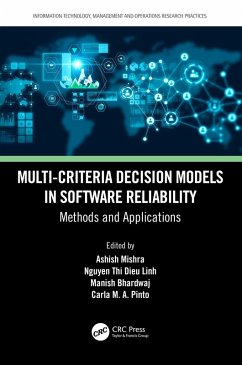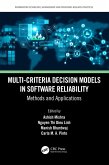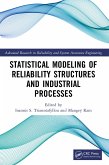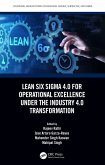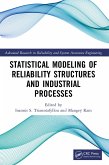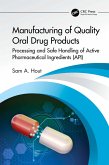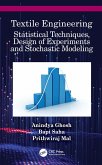Multi-Criteria Decision Models in Software Reliability (eBook, ePUB)
Methods and Applications
Redaktion: Mishra, Ashish; Pinto, Carla M. A.; Bhardwaj, Manish; Linh, Nguyen Thi Dieu
48,95 €
48,95 €
inkl. MwSt.
Sofort per Download lieferbar

24 °P sammeln
48,95 €
Als Download kaufen

48,95 €
inkl. MwSt.
Sofort per Download lieferbar

24 °P sammeln
Jetzt verschenken
Alle Infos zum eBook verschenken
48,95 €
inkl. MwSt.
Sofort per Download lieferbar
Alle Infos zum eBook verschenken

24 °P sammeln
Multi-Criteria Decision Models in Software Reliability (eBook, ePUB)
Methods and Applications
Redaktion: Mishra, Ashish; Pinto, Carla M. A.; Bhardwaj, Manish; Linh, Nguyen Thi Dieu
- Format: ePub
- Merkliste
- Auf die Merkliste
- Bewerten Bewerten
- Teilen
- Produkt teilen
- Produkterinnerung
- Produkterinnerung

Bitte loggen Sie sich zunächst in Ihr Kundenkonto ein oder registrieren Sie sich bei
bücher.de, um das eBook-Abo tolino select nutzen zu können.
Hier können Sie sich einloggen
Hier können Sie sich einloggen
Sie sind bereits eingeloggt. Klicken Sie auf 2. tolino select Abo, um fortzufahren.

Bitte loggen Sie sich zunächst in Ihr Kundenkonto ein oder registrieren Sie sich bei bücher.de, um das eBook-Abo tolino select nutzen zu können.
This book provides insights into contemporary issues and challenges in Multi-Criteria decision Models. It is a useful guide for identifying, understanding and categorizing Multi-Criteria Decision Models, and ultimately implementing the analysis for effective decision-making.
- Geräte: eReader
- ohne Kopierschutz
- eBook Hilfe
- Größe: 16.85MB
Andere Kunden interessierten sich auch für
![Multi-Criteria Decision Models in Software Reliability (eBook, PDF) Multi-Criteria Decision Models in Software Reliability (eBook, PDF)]() Multi-Criteria Decision Models in Software Reliability (eBook, PDF)48,95 €
Multi-Criteria Decision Models in Software Reliability (eBook, PDF)48,95 €![Statistical Modeling of Reliability Structures and Industrial Processes (eBook, ePUB) Statistical Modeling of Reliability Structures and Industrial Processes (eBook, ePUB)]() Statistical Modeling of Reliability Structures and Industrial Processes (eBook, ePUB)48,95 €
Statistical Modeling of Reliability Structures and Industrial Processes (eBook, ePUB)48,95 €![Lean Six Sigma 4.0 for Operational Excellence Under the Industry 4.0 Transformation (eBook, ePUB) Lean Six Sigma 4.0 for Operational Excellence Under the Industry 4.0 Transformation (eBook, ePUB)]() Lean Six Sigma 4.0 for Operational Excellence Under the Industry 4.0 Transformation (eBook, ePUB)100,95 €
Lean Six Sigma 4.0 for Operational Excellence Under the Industry 4.0 Transformation (eBook, ePUB)100,95 €![Additive Manufacturing for Plastic Recycling (eBook, ePUB) Additive Manufacturing for Plastic Recycling (eBook, ePUB)]() Additive Manufacturing for Plastic Recycling (eBook, ePUB)48,95 €
Additive Manufacturing for Plastic Recycling (eBook, ePUB)48,95 €![Statistical Modeling of Reliability Structures and Industrial Processes (eBook, PDF) Statistical Modeling of Reliability Structures and Industrial Processes (eBook, PDF)]() Statistical Modeling of Reliability Structures and Industrial Processes (eBook, PDF)48,95 €
Statistical Modeling of Reliability Structures and Industrial Processes (eBook, PDF)48,95 €![Manufacturing of Quality Oral Drug Products (eBook, ePUB) Manufacturing of Quality Oral Drug Products (eBook, ePUB)]() Sam A. HoutManufacturing of Quality Oral Drug Products (eBook, ePUB)48,95 €
Sam A. HoutManufacturing of Quality Oral Drug Products (eBook, ePUB)48,95 €![Textile Engineering (eBook, ePUB) Textile Engineering (eBook, ePUB)]() Anindya GhoshTextile Engineering (eBook, ePUB)63,95 €
Anindya GhoshTextile Engineering (eBook, ePUB)63,95 €-
-
-
This book provides insights into contemporary issues and challenges in Multi-Criteria decision Models. It is a useful guide for identifying, understanding and categorizing Multi-Criteria Decision Models, and ultimately implementing the analysis for effective decision-making.
Dieser Download kann aus rechtlichen Gründen nur mit Rechnungsadresse in A, B, BG, CY, CZ, D, DK, EW, E, FIN, F, GR, HR, H, IRL, I, LT, L, LR, M, NL, PL, P, R, S, SLO, SK ausgeliefert werden.
Produktdetails
- Produktdetails
- Verlag: Taylor & Francis eBooks
- Seitenzahl: 320
- Erscheinungstermin: 30. November 2022
- Englisch
- ISBN-13: 9781000778823
- Artikelnr.: 66009003
- Verlag: Taylor & Francis eBooks
- Seitenzahl: 320
- Erscheinungstermin: 30. November 2022
- Englisch
- ISBN-13: 9781000778823
- Artikelnr.: 66009003
- Herstellerkennzeichnung Die Herstellerinformationen sind derzeit nicht verfügbar.
Dr. Ashish Mishra is currently working as a Professor in Department of Computer Science and Engineering, Gyan Ganga Institute of Technology and Sciences, Jabalpur [M.P], India. He is a qualified individual with around 17 years of expertise in Teaching, R&D with specialization in Computer Science Engineering. He is B.E., M.Tech &,M.B.A. He received his Ph.D. degree from AISECT University, Bhopal, India. Been a part of various seminars, webinar, paper presentations, research paper reviews, conferences as co-convener, Member of Organizing Committee, Member of Advisory Committee, Member of Technical Committee and contribution in organizing INSPIRE Science Internship Camp. Senior Member of IEEE, Life Member of CSI, Secretary CSI Jabalpur Chapter. He has published many research papers in reputed journals and conferences. He also has papers in Springer and IEEE conference. He is also a reviewer and Session Chair, Keynote Speaker of IEEE, Springer international conferences, CSNT-2015, CICN-2016, CICN2017, INDIACom-2019, and ICICC-CONF 2019, ICICC-CONF 2020, ICICC-CONF 2021. His research interests include IOT, Data Mining, Cloud Computing, Image Processing and Knowledge-based systems. He published 25 patents in Intellectual Property, India. He published 8 books in the area of data mining, Image Processing and Artificial Intelligence. Dr. Nguyen Thi Dieu Linh is currently working as a Dy. Head of Science and Technology Department, Hanoi University of Industry, Vietnam (HaUI).She received Ph.D in Information and Communication Engineering from Harbin Institute of Technology, Harbin, China. She has more than 19 years of academic experience in electronics, IoT, Telecommunication, Big Data and Artificial Intelligence. She has published more than 30 research articles in national and international journals, books and conference proceedings. She is reviewer for Information Technology Journal, Mobile Networks and Applications Journal, and some international conferences. Now she is an editor for some books such as "Artificial Intelligence Trends for Data Analytics Using Machine Learning and Deep Learning Approaches", "Distributed Artificial Intelligence: A Modern Approach" publisher by Taylor & Francis Group, LLC; " Data Science and Medical Informatics in Healthcare Technologies" publish by Springer Otherwise, she is an editor of International Journal of Hyperconnectivity and the Internet of Things (IJHIoT) IGI-Global, USA. Dr. Manish Bhardwaj is currently working as an Assistant Professor Research in Department of Computer Science and Engineering, KIET Group of Institutions, Muradnagar, Ghaziabad, India. He is a qualified individual with around 11 years of expertise in Teaching, R&D with specialization in Computer Science Engineering. He received his Ph.D. degree from Dr. Abdul Klam Technical University (AKTU), Lucknow, India. Completed M.Tech (Computer Science & Engineering) from SRM University, Chennai (Gold Medalist, received award from former central health minister Mr. Gulam Nabi Azad). Contributing his enormous Academics and research works in the area of Computer Science, Simulations, Mobile Ad hoc network protocols, Wireless Sensor Networks. He has published nearly 48 Research papers in various International Journals/Conferences. He is also contributing in nearly 150 International Conferences and Journals as General Chair, International Scientific Committee members/reviewer (SCOPUS index journals and conferences) and Editorial Board Member/reviewer in reputed Journals like IEEE, Springer. He contributes 1 Book as Editor and 8 book chapters in various renowned database like CRC Press, IGI Global and etc. He is contributed nearly 13 patents (10 National + 3 International). Dr. Carla M.A. Pinto is a Coordinating Professor in the School of Engineering, Polytechnic of Porto, Portugal. She has a PhD degree in the scientific area of Mathematics, since January 2004. Her main research topic is epidemiology, in particular Mathematical Epidemiology. She is interested in mathematical challenges and their role in providing advice on public health policies. Dr. Pinto is trained in Nonlinear Dynamics, Bifurcation Theory. Previous research included the analysis of Central Pattern Generators for Animal and Robot Locomotion, coupled cell networks, neuron-like equations (Hodgkin-Huxley equations, Fitz-Hugh Nagumo, Morris-Lecar). She has published more than 100 papers in international journals and conferences. She is Guest Editor of several special issues in reputable scientific journals. Her h-index is 20 and she has more than 1800 citations. She is in the Stanford University Names World's Top 2% Scientists - Sept 1, 2022.
1. Enhancing Software Reliability by Evaluating Prediction Accuracy of CBF
Algorithm Using Machine Learning. 2. Significance of Machine Learning and
Deep Learning in Development of Artificial Intelligence. 3. Implication of
Soft Computing and Machine Learning Method for Software Quality, Defect and
Model Prediction. 4. Ambiguity Based on Working and Functionality in
Deployed Software from Client Side in Prototype SDLC Model Scenario. 5.
Selection of Software Programmer Using Fuzzy MCDM Technique in Software
Engineering Scenario. 6. Implementing Multi-Criteria Decision-Making to
Detect Potential Onset of Heart Disease. 7. State-of-the-Art Literature
Review on Classification of Software Reliability Models. 8. Survey on
Software Reliability Modelling and Quality Improvement Techniques. 9.
Multi-Criteria Decision Management for Software Vulnerabilities Analysis.
10. On a Safety Evaluation of Artificial Intelligence-Based Systems to
Software Reliability. 11. Study and Estimation of Existing Software Quality
Models to Predict the Reliability of Component-Based Software. 12.
Performance of Multi-Criteria Decision-Making Model in Software Engineering
- A Survey. 13. Optimization Software Development Plan. 14. A Time-Variant
Software Stability Model For Error Detection. 15. Software Vulnerability
Analysis.
Algorithm Using Machine Learning. 2. Significance of Machine Learning and
Deep Learning in Development of Artificial Intelligence. 3. Implication of
Soft Computing and Machine Learning Method for Software Quality, Defect and
Model Prediction. 4. Ambiguity Based on Working and Functionality in
Deployed Software from Client Side in Prototype SDLC Model Scenario. 5.
Selection of Software Programmer Using Fuzzy MCDM Technique in Software
Engineering Scenario. 6. Implementing Multi-Criteria Decision-Making to
Detect Potential Onset of Heart Disease. 7. State-of-the-Art Literature
Review on Classification of Software Reliability Models. 8. Survey on
Software Reliability Modelling and Quality Improvement Techniques. 9.
Multi-Criteria Decision Management for Software Vulnerabilities Analysis.
10. On a Safety Evaluation of Artificial Intelligence-Based Systems to
Software Reliability. 11. Study and Estimation of Existing Software Quality
Models to Predict the Reliability of Component-Based Software. 12.
Performance of Multi-Criteria Decision-Making Model in Software Engineering
- A Survey. 13. Optimization Software Development Plan. 14. A Time-Variant
Software Stability Model For Error Detection. 15. Software Vulnerability
Analysis.
1. Enhancing Software Reliability by Evaluating Prediction Accuracy of CBF
Algorithm Using Machine Learning. 2. Significance of Machine Learning and
Deep Learning in Development of Artificial Intelligence. 3. Implication of
Soft Computing and Machine Learning Method for Software Quality, Defect and
Model Prediction. 4. Ambiguity Based on Working and Functionality in
Deployed Software from Client Side in Prototype SDLC Model Scenario. 5.
Selection of Software Programmer Using Fuzzy MCDM Technique in Software
Engineering Scenario. 6. Implementing Multi-Criteria Decision-Making to
Detect Potential Onset of Heart Disease. 7. State-of-the-Art Literature
Review on Classification of Software Reliability Models. 8. Survey on
Software Reliability Modelling and Quality Improvement Techniques. 9.
Multi-Criteria Decision Management for Software Vulnerabilities Analysis.
10. On a Safety Evaluation of Artificial Intelligence-Based Systems to
Software Reliability. 11. Study and Estimation of Existing Software Quality
Models to Predict the Reliability of Component-Based Software. 12.
Performance of Multi-Criteria Decision-Making Model in Software Engineering
- A Survey. 13. Optimization Software Development Plan. 14. A Time-Variant
Software Stability Model For Error Detection. 15. Software Vulnerability
Analysis.
Algorithm Using Machine Learning. 2. Significance of Machine Learning and
Deep Learning in Development of Artificial Intelligence. 3. Implication of
Soft Computing and Machine Learning Method for Software Quality, Defect and
Model Prediction. 4. Ambiguity Based on Working and Functionality in
Deployed Software from Client Side in Prototype SDLC Model Scenario. 5.
Selection of Software Programmer Using Fuzzy MCDM Technique in Software
Engineering Scenario. 6. Implementing Multi-Criteria Decision-Making to
Detect Potential Onset of Heart Disease. 7. State-of-the-Art Literature
Review on Classification of Software Reliability Models. 8. Survey on
Software Reliability Modelling and Quality Improvement Techniques. 9.
Multi-Criteria Decision Management for Software Vulnerabilities Analysis.
10. On a Safety Evaluation of Artificial Intelligence-Based Systems to
Software Reliability. 11. Study and Estimation of Existing Software Quality
Models to Predict the Reliability of Component-Based Software. 12.
Performance of Multi-Criteria Decision-Making Model in Software Engineering
- A Survey. 13. Optimization Software Development Plan. 14. A Time-Variant
Software Stability Model For Error Detection. 15. Software Vulnerability
Analysis.
